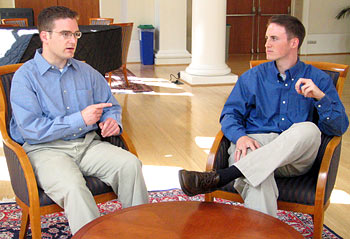Cooney and Schochet Take Moot Court Finals

The laurels in the 75th annual William Minor Lile Moot Court Competition have gone to J.P. Cooney and John Schochet in a close and brilliantly argued contest with Eric Dowell and Thomas Bednar. Bednar took personal honors for best oralist in the final round argument.
Cooney and Schochet convinced a panel of three U.S. Circuit Court of Appeal judges, cast in the role of Supreme Court justices for purposes of the competition, that the 1789 Alien Tort Statute does not grant alien plaintiffs the right to sue alien defendants in American courts for events that did not happen in the United States but constitute violations of international law. Cooney and Schochet also argued that, even if the Alien Tort Statute granted a cause of action for violations of international law, "cruel, inhuman, or degrading treatment" does not constitute a violation of international law under the statute. The moot court case closely parallels the underlying issue in a case argued before the Supreme Court of the United States in April, Sosa v. Alvarez-Machain.
"The way we tried to present the argument, it's not a question of whether it's a good idea to let aliens bring these kinds of suits in American courts, but a question of whether Congress provided for it in the statute," Schochet said.
The competition began last year with more than 150 participants and, four rounds of brief-writing and five rounds of oral argument later, ended with Cooney and Schochet as the winners of its tournament-style final showdown.
The teams argued before Chief Judge Douglas H. Ginsburg of the U.S. Court of Appeals for the District of Columbia, Judge R. Lanier Anderson III of the Eleventh Circuit, and Judge Julia Smith Gibbons of the Sixth Circuit.
"The judges were excellent," said Cooney. "They asked difficult questions. However, we felt like we were well prepared for it. The people who mooted us, our friends here, were really on the ball. So when the judges' questions came, we were ready."
"We're pretty proud of it," he said. "We worked our butts off. It's easily the equivalent of taking another class-and then some. For the last two-and-a-half weeks we had our friends quizzing and grilling us every night."
While most litigation surrounding the Alien Tort Statute has focused on implied cause of action doctrine, Cooney and Schochet also presented a constitutional argument, asserting that courts do not have the power under Article III of the U.S. Constitution to make international law the law of the United States without explicit authorization by Congress. Virginia professors Curtis Bradley and Jack Goldsmith were the first legal academics to make the constitutional argument about the Alien Tort Statute, Schochet noted.
"The key thing is the brief," said Cooney to explain their success in oral argument. "We edited each other's work so much that we could have argued each other's case," added Schochet, who met Cooney as a section-mate his first year.
"One of the reasons we enjoyed the moot court competition so much and that it was easily worth all the effort is that it teaches practical skills so well," said Schochet. "It's not just the brief writing, it's the oral argument. I was a decent brief-writer before, but I feel like I've improved immensely over the course of the competition. It's the practice." Schochet will have a note published in the June issue of the Virginia Law Review, coauthored with second-year James DiTullio and advised by law professor Michael Klarman.
Cooney taught high school in Chicago for two years before coming to law school, and credits his teaching experience with giving him better presentation skills. "When you go before a court you're trying to teach the judge or the jury what they need to know."
Cooney, a native of Arlington who graduated from Notre Dame, will clerk for the Hon. Robert Doumar, a Federal District judge in Norfolk, next year before beginning work with Jones Day in Washington, D.C. Schochet, a Californian who attended Yale, is joining the firm of Lane Powell Spears Lubersky in Seattle.
Founded in 1819, the University of Virginia School of Law is the second-oldest continuously operating law school in the nation. Consistently ranked among the top law schools, Virginia is a world-renowned training ground for distinguished lawyers and public servants, instilling in them a commitment to leadership, integrity and community service.